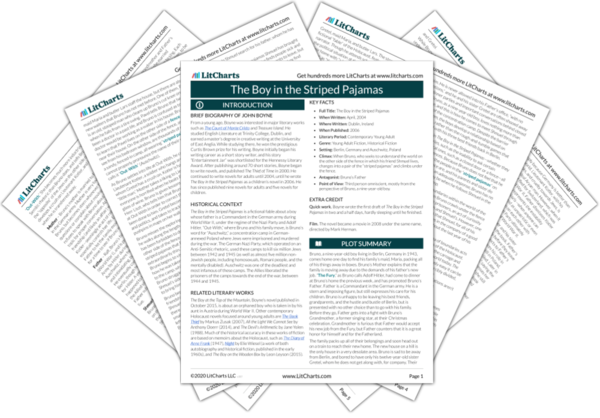The perpetuation of traditional gender roles is present throughout the novel, and contributes to much of the misinformation and miscommunication between the characters. Father is the definitive patriarch of the family, and he is in charge of what the entire family does and where they go. Bruno aspires to be as big and strong as his father, but also feels conflicted in his relationship with his father because of how he appears to treat Mother, the maid, Maria, and Grandmother, who vehemently abhors Father’s role in the Nazi army.
Mother often disagrees with Father’s choices, but as the woman in the relationship, when Father makes a decision, she knows she must follow it. She has taken to passive-aggressively complaining about “some people” in the household when she is upset, a moniker that Bruno has come to realize means “Father.” When she is unhappy at Auschwitz, Mother takes many “naps” and drinks “medicinal sherries,” showing that she is attempting to sedate herself to escape her misery, as she has no real agency or power of her own. Though it is never explicitly stated, it is insinuated that Mother engages in an affair with nineteen-year-old Lieutenant Kotler, an act of subversion towards Father, and one of the only ways in which Mother is able to exercise her will. Eventually, Father consents to letting the family move back to Berlin, but only after what has been almost a year of convincing, and likely a product of his problematic relationship with Mother: Father is to remain at Auschwitz while Mother takes the children back to Berlin.
Maria, the maid, feels conflicted regarding Father’s character, as she knows of the horrors he orchestrates at Auschwitz, but cannot forget the kindness he has shown towards her and her late mother. As a servant, she knows she cannot express her feelings without being thrown out of the house, and she only reveals them to Bruno when no one else is listening, in an attempt to make him understand the nuances of his Father’s nature. Grandmother, on the other hand, has no difficulty making it known how atrocious she thinks Father’s new role as Commandant is. She proclaims that she would rather “tear her eyes from her head” than look at Father in his new uniform. Grandfather berates her for speaking her mind, and Father continually counters her arguments against Hitler and the Nazi regime. Grandmother dies before she can reconcile with her son, and her disapproval seems to have no effect on his life choices.
The adult women in the novel, bound by their traditional gender roles, each have their own negative opinions regarding Father’s role at Auschwitz, but they are disregarded due to their secondary status to men. This lack of regard leads to a breakdown of communication—Mother does not discuss what Father does with Bruno, or why they are truly moving to Auschwitz, likely because she is too depressed about her inability to have a say in the matter. Grandmother’s opinions are dismissed as well, and this fact is never discussed or explained to Bruno. Most of the women are therefore completely silent in their opposition to Auschwitz and the Nazi agenda as a whole. This sexism does not excuse their complicity, but it does show how the Nazi philosophy of prejudice and hatred extended in many directions at once, so that even “pure Aryan” women were made to be submissive and act out traditional gender roles, having little to no say in real decision-making. Within the novel, this leads to a lack of communication that keeps Bruno ignorant, and ultimately causes his death when he has no idea what he is getting himself into when he crawls under the fence.
Gender Roles ThemeTracker

Gender Roles Quotes in The Boy in the Striped Pajamas
Chapter 1 Quotes
“It’s a very important job,” said Mother, hesitating for a moment. “A job that needs a very special man to do it. You can understand that, can’t you?”
Chapter 2 Quotes
“We don’t have the luxury of thinking,” said Mother. “…Some people make all the decisions for us.”
Chapter 6 Quotes
“Bruno, if you have any sense at all, you will stay quiet and concentrate on your schoolwork and do whatever your father tells you. We must all just keep ourselves safe until this is all over. That’s what I intend to do anyway. What more can we do than that after all? It’s not up to us to change things.”
Chapter 17 Quotes
He paused for a moment and looked out the window to his left—the window that led off to a view of the camp on the other side of the fence. “When I think about it, perhaps she is right. Perhaps this is not a place for children.”
Chapter 20 Quotes
Of course all this happened a long time ago and nothing like that could ever happen again.
Not in this day and age.











